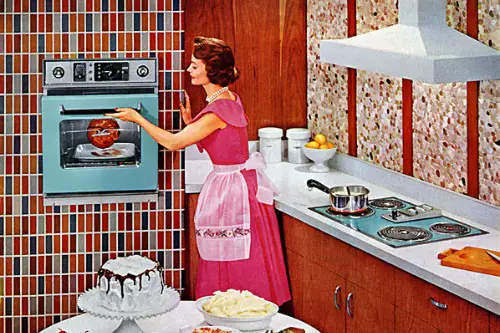1. Changing Gender Roles

Boomers and Millennials also have different perspectives on gender roles, influenced by the times they grew up in. Boomers saw a more rigid structure for gender roles. Men were often expected to be the breadwinners, and women were primarily homemakers. This societal structure was common throughout the Boomer years, and while there were exceptions, many still adhered to these expectations. Even as the feminist movement gained momentum in the 60s and 70s, the gender divide in careers, responsibilities, and household roles remained significant for much of their lives.
Millennials have a more progressive view of gender roles, with many challenging traditional stereotypes, according to the National Institutes of Health (NIH). Both men and women in the Millennial generation are more likely to share household duties, parenting responsibilities, and career ambitions equally. Millennials are also more likely to support gender diversity and equality in the workplace, pushing for greater representation of women and non-binary individuals in various fields. This shift in perspective can sometimes create tension with Boomers, who may still hold onto older views about gender roles and expectations.
2. Different Economic Realities

The financial worlds of Boomers and Millennials couldn’t be more different. For Boomers, buying a house was relatively affordable, especially in their younger years. When they were starting out, housing prices were much more reasonable compared to wages, and a steady job could support a family comfortably. The opportunity to get a job and build a career was often more attainable, and the costs for basic goods were lower in general. This contributed to a more stable financial environment for many Boomers, especially in the post-WWII era when the economy was booming.
In contrast, Millennials entered adulthood during or after the Great Recession, where economic opportunities were not as abundant. Housing prices have skyrocketed in many cities, and wages have not kept up with the rising cost of living. Additionally, student loan debt has burdened Millennials more than any previous generation, making it harder for them to achieve financial independence. This means that while Boomers may talk about their successes, Millennials face an entirely different set of obstacles, often leaving them frustrated by the comparison, CNN reports.
3. Views on Environmental Responsibility

Boomers and Millennials also have differing views on environmental issues. Boomers grew up in an era where industrialization was celebrated, and environmental concerns were less prominent. While some Boomers care deeply about nature and conservation, the broader generational perspective didn’t focus much on climate change or sustainable living. Many Boomers remember a time when products were made to last, and recycling wasn’t a major concern.
Millennials, by contrast, are far more attuned to the environmental issues facing the world today, according to the Wall Street Journal. Climate change, sustainability, and reducing waste are often at the forefront of their minds. They are more likely to buy eco-friendly products, embrace plant-based diets, and support companies that prioritize sustainability. Millennials tend to demand more accountability from both businesses and governments when it comes to environmental policies, making the divide between the generations clear on this issue. While Boomers may view these concerns as overblown, Millennials see them as urgent and essential for the future.
4. Attitudes Towards Diversity and Inclusion

Finally, one of the biggest cultural differences between Boomers and Millennials is their approach to diversity and inclusion. Boomers were raised during a time when racial, gender, and cultural homogeneity was the norm. While the civil rights movement and other social justice movements worked to change this, many Boomers still hold on to outdated views about race, gender, and sexuality. They may not always see the importance of diverse representation or inclusivity in society or workplaces.
Millennials, however, are often far more progressive when it comes to diversity and inclusion, according to the Washington Post. They champion racial, gender, and LGBTQ+ equality and view these issues as central to social progress. Millennials are more likely to embrace diverse cultures, languages, and perspectives, and they expect this diversity to be reflected in their workplaces, media, and public life. This generational divide often leads to clashes, as Boomers might resist certain progressive changes, while Millennials demand more inclusivity and representation across all areas of society.
5. Work-Life Balance Expectations

Boomers were generally raised with the mindset that work should come first. The idea of working long hours, even at the expense of family or personal time, was more normalized for them. Their careers were often seen as a way to climb up the ladder and secure stability for their families. Many Boomers stayed in one job for decades, believing loyalty to an employer was paramount. Personal life was often secondary to career advancement, and the concept of work-life balance was not a priority.
Millennials, on the other hand, value work-life balance much more, Forbes claims. They’re likely to prioritize their personal well-being, hobbies, and family life over a job that demands excessive hours. The rise of flexible work hours, remote work, and the gig economy fits well with Millennial expectations. They want jobs that not only pay well but also offer personal fulfillment and leave time for life outside of work. Boomers may see this as a lack of commitment or a sign of entitlement, while Millennials feel it’s a healthier approach to life.
6. Social Media and Communication Styles

Communication is another area where Boomers and Millennials clash. Boomers are more accustomed to face-to-face communication, phone calls, and even written letters. For them, conversations have traditionally been more personal and direct. Boomers value in-person interactions and may find texting or social media conversations to be impersonal or even confusing. They tend to see phone calls as more meaningful than a quick text message, associating the former with seriousness and respect.
Millennials, however, have grown up in the age of digital communication. Texting, instant messaging, and social media are their primary methods of staying in touch. They often prefer the convenience and immediacy of these digital interactions and may not feel the need for the formality that Boomers associate with phone calls or letters. To Millennials, it’s more about efficiency and flexibility. The gap in communication styles can sometimes create friction, as Boomers might view Millennials as impolite, while Millennials may find Boomers’ approach to be outdated.
7. Political Views and Ideology

Politics is one of the biggest areas where Boomers and Millennials diverge. Boomers, generally speaking, were raised with more conservative ideals, often influenced by post-war American values. Many Boomers identify with traditional political parties, believing in the importance of strong national defense, free-market capitalism, and limited government intervention. Their experiences growing up in the Cold War and through periods of political upheaval shaped their worldview, leading to more conservative stances on issues such as immigration and taxation.
Millennials, on the other hand, tend to lean more progressive. Raised in a time of increasing globalization, social change, and awareness of issues like inequality and climate change, Millennials often advocate for policies that promote social justice, equality, and environmental responsibility. They’re more likely to support progressive candidates and movements that aim to challenge the status quo and push for greater systemic reforms. The political gap between these generations is profound, with Millennials pushing for a more inclusive, compassionate approach to governance, while Boomers may favor preserving traditions and institutions.
8. Attitudes Towards Marriage and Family

When it comes to family dynamics, Boomers and Millennials have different attitudes toward marriage and having children. For Boomers, marriage was often seen as a natural step in life, and many of them married at a relatively young age. The traditional nuclear family was the norm, and there was societal pressure to settle down, get married, and have children. Marriage was often considered a cornerstone of adulthood, and divorce rates were relatively lower during the earlier years of the Boomer generation.
Millennials, however, have a more relaxed view of marriage and family. They are waiting longer to marry and have children, often prioritizing personal and professional goals before settling down. Many Millennials question traditional concepts of family and are more open to non-traditional family structures, including single-parent households, cohabitation without marriage, and choosing not to have children. The delay in marriage and family formation is also driven by economic factors, such as student debt and the cost of living, which make starting a family seem more daunting.
9. Work Preferences and Job-Hopping

Boomers typically stayed in one job for decades, often with the same company, and saw career longevity as a sign of success and loyalty. For many Boomers, working their way up the corporate ladder and staying in a stable job with benefits was a key part of the American Dream. The concept of job loyalty and job security was important, and many Boomers found satisfaction in working in a role for the long term, even if it wasn’t always their dream job.
Millennials, in stark contrast, are known for job-hopping. They tend to view careers as fluid, with many moving between jobs more frequently than their Boomer counterparts. Millennials seek not only financial stability but also personal fulfillment, and they’re less likely to stay in a job that doesn’t align with their values or long-term goals. The shift towards freelancing, remote work, and entrepreneurial ventures is a hallmark of Millennial work culture, making them less inclined to stay in traditional corporate environments for extended periods. This approach frustrates some Boomers, who view job-hopping as a lack of commitment or stability.
10. Financial Planning and Retirement

The concept of retirement has evolved drastically between the Boomer and Millennial generations. For Boomers, the traditional model of working for decades, receiving a pension, and retiring at 65 was the standard. The idea of enjoying a long retirement with adequate savings and healthcare was very much the goal for many. Boomers had more access to company pensions, healthcare plans, and Social Security, which made retirement seem more attainable.
For Millennials, however, the future of retirement is much less clear. With fewer employer-sponsored pension plans and the rise of freelance and gig work, Millennials are less likely to have the same level of financial security that Boomers enjoyed. Many Millennials are worried about their ability to retire comfortably and feel like they’ll have to work longer, often without the same level of benefits. With increased uncertainty about Social Security and healthcare, Millennials face a far more challenging financial future, leaving Boomers struggling to understand these modern concerns.
11. Consumerism and Materialism

Boomers were often raised to value material possessions and view financial success as a reflection of personal worth. The pursuit of homeownership, cars, and expensive gadgets was tied to their vision of success. Many Boomers grew up in an era where hard work and buying things were symbols of achieving the American Dream. Consumerism was celebrated, and accumulating wealth and assets was the ultimate goal for many in their generation.
Millennials, however, have a more critical approach to consumerism. They’re more likely to question the need for excessive material possessions and are often drawn to minimalism and experiences over things. Many Millennials prefer spending on travel, dining, and experiences rather than accumulating expensive products. This shift in consumer values can sometimes frustrate Boomers, who see Millennials as less interested in securing tangible assets. Millennials, in turn, view Boomers’ material focus as a result of their different upbringing.
12. Health and Fitness Priorities

Health and wellness have been a priority for both generations, but the way they approach fitness and self-care is different. Boomers often adopted fitness routines later in life, with many turning to traditional forms of exercise like jogging, aerobics, or gym workouts in their middle years. They grew up in an era when healthcare was less focused on preventive measures and more on treating illness after it happened. Many Boomers still view fitness and health as essential for living longer, but the trend towards holistic and personalized approaches was not a key focus during their younger years.
Millennials have a broader view of health, focusing not only on physical fitness but also on mental well-being, stress management, and nutrition. Many Millennials embrace a holistic approach to health, incorporating practices like yoga, meditation, and mindfulness into their daily routines. They prioritize preventive care, choosing healthier lifestyles and diets. This approach to self-care often includes a focus on mental health, which Boomers may not have valued as much in their youth. As a result, Millennials may find Boomers’ focus on traditional health and fitness routines to be somewhat outdated.
13. Approach to Technology

Boomers came of age in a time when technology was far less integrated into daily life. Many had to learn how to use computers, the internet, and smartphones later in life, and while they adapted, they still often rely on traditional methods for most tasks. Whether it’s checking the news via TV or reading physical books, the digital transformation of life wasn’t a part of their upbringing. The pace of technological advancement is often overwhelming to some Boomers, leading to a preference for simpler, more familiar methods.
Millennials, on the other hand, were born into the rise of the internet and digital technology. They’ve seen the world transition from dial-up internet to 5G, and many grew up using computers, smartphones, and social media as second nature. To them, the internet is an integral part of everything they do, from shopping and socializing to working and learning. The Millennial generation tends to embrace new technology much quicker, often leaving Boomers behind in terms of how comfortable and capable they are with these tools.


